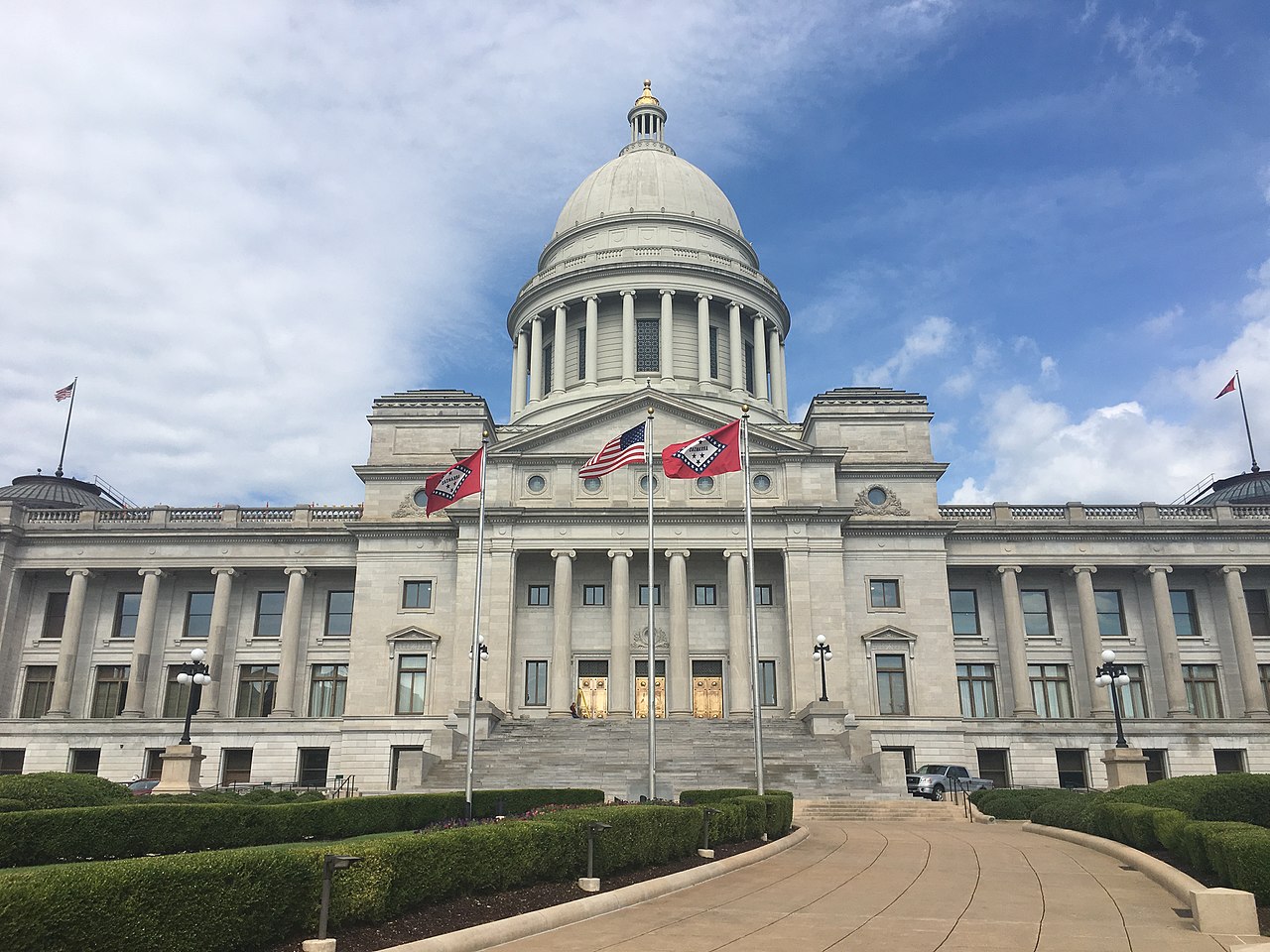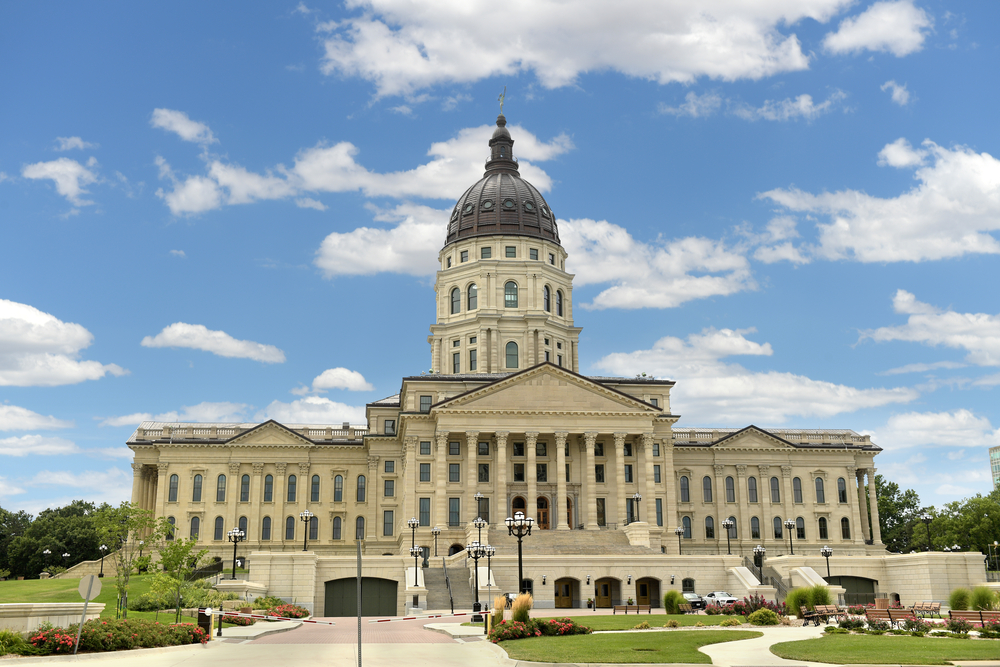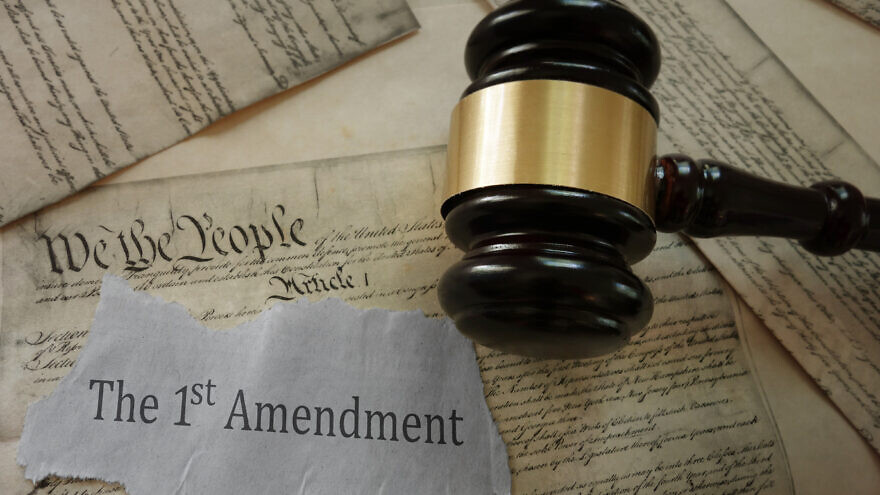In the highest-level challenge yet to American laws prohibiting boycotts of Israel, the 8th U.S. Circuit Court of Appeals in St. Louis ruled on Wednesday that an Arkansas law limiting state business with those who refuse to sign a pledge not to boycott Israel is not a violation of the First Amendment.
The 9-1 decision in the case of Arkansas Times LP v. Waldrip, made by the entire court, reverses a ruling by a three-judge panel that the law was unconstitutional. It is the first full federal appeals court ruling on state anti-BDS laws, which around 35 states have enacted. The court ruled that Arkansas Act 710 only regulates business activity, not expressive conduct, and thus raises no issues under the First Amendment.
The Arkansas Times challenged the law, with the support of the ACLU, contending it was unconstitutional compelled speech.
In a 17-page opinion rendered on Wednesday, the court sided with the defendant, the University of Arkansas Board of Trustees. They were sued because the Times faced losing advertising with the Pulaski Tech branch of the university unless it signed the pledge or agreed to provide services at a 20 percent discount.
As for whether the state law “compelled” speech, the court wrote: “We are not aware of any cases where a court has held that a certification requirement concerning unprotected, nondiscriminatory conduct is unconstitutionally compelled speech. A factual disclosure of this kind, aimed at verifying compliance with unexpressive conduct-based regulations, is not the kind of compelled speech prohibited by the First Amendment.”
Attorney and policy specialist Joseph Sabag, executive director of Israeli-American Coalition for Action, has led the drafting of anti-BDS legislation in a number of states, including Arkansas. He told JNS that the decision was expected and is a strong rebuke of the previous decision.
“The plaintiff said he anticipated losing, but would press ahead and appeal to the U.S. Supreme Court. It will turn into a lesson for him because there are so many other anti-discrimination laws of the same nature that he risks bringing them into question. [This] decision is short on words, and one gets the sense that the judges in the majority were trying to be collegial and didn’t want to humiliate their one colleague who dissented,” explained Sabag.
The largest pro-Israel organization in the United States, Christians United for Israel (CUFI), released a statement in reaction to the court’s ruling, calling BDS an inherently anti-Semitic movement seeking to wage economic warfare against the world’s only Jewish state.
“The court’s conclusion should put to bed any arguments put forth by bigots who won’t simply settle for demonizing and boycotting Israel but want the state to aid and abet that appalling endeavor,” said attorney and CUFI Action Fund chairwoman Sandra Parker.

‘A ridiculous government overreach’
Back in February, a three-judge panel of the 8th Circuit Court of Appeals overturned a lower court decision and held, by a 2-1 vote, that an Arkansas law requiring government contractors to pledge not to boycott Israel or be required to reduce their fees by 20% violates the First Amendment. The lawsuit was filed on behalf of the Arkansas Times newspaper, which was penalized by the state government after it refused to certify that it is not boycotting Israel or Israel-controlled territories.
Some BDS supporters presented the decision by the appeals court as a game-changer that would lead to a domino effect striking down all anti-BDS laws on free-speech grounds. But legal experts said the decision was narrower and pertained only to government contracts, as opposed to divestment and other anti-BDS policies some states have formulated. Either way, the panel’s decision was a fleeting win for the BDS movement.
The act in question is titled “An Act To Prohibit Public Entities From Contracting With and Investing in Companies That Boycott Israel; And for Other Purposes.” The district court that first heard the case denied the Arkansas Times’s motion for a preliminary injunction and dismissed the suit.
Arkansas Times LP has contracted with state actors to run advertisements in its various publications for Pulaski Technical College (UAPTC). On the basis of the law, UAPTC demanded that Arkansas Times CEO Alan Leveritt sign a certification agreeing that Arkansas Times LP will not engage in a boycott of Israel as a condition of the contract. Leveritt refused to sign any such certification and, accordingly, UAPTC refused to enter into further advertisement contracts with Arkansas Times LP. Leveritt has said that he has no active interest in boycotting Israel, though he is highly critical of an evangelical Christian-heavy legislature that passed the applicable law, claiming that it is tying religion and state together.
Leveritt reacted to Wednesday’s ruling largely as expected.
“We consider being banned from doing business with our state government for refusing to sign a pledge not to boycott Israel a ridiculous government overreach that has nothing to do with Arkansas. More importantly, in our particular case, it requires the Arkansas Times to take a political position in return for advertising. We don’t do that. I acknowledge that this ruling will continue to damage us financially. The good news is that we have received tremendous support from our readers to the point that we now have over 3,000 paid online subscribers, which has done much to cushion the financial impact of this law. In meetings with our ACLU attorneys this morning we anticipate an appeal to the U.S. Supreme Court,” he wrote.
The three-judge panel’s decision was technical in nature, centering on a two-word phrase in Arkansas’s anti-boycott law: “other actions.”
The district court initially dismissed the lawsuit action on the grounds that a boycott of Israel, as defined by the law, is neither speech nor inherently expressive conduct. The three-judge appeals panel found that the statutory term “other actions” in the definition of “boycott Israel” and “boycott of Israel” encompasses more than commercial conduct, similar to refusing to deal with or terminate business activities. Instead, the panel ruled, the act seeks to restrict government contractors’ ability to participate in speech and other protected, boycott-associated activities recognized as entitled to protection under Supreme Court precedent because the act prohibits the contractor from engaging in boycott activity outside the scope of the contractual relationship “on its own time and dime.”
Sabag said the original decision of the 8th Circuit Court panel incorrectly applied the general principle of statutory construction known by the Latin phrase ejusdem generis, which means “of the same kind.” This rule governs how a general word or phrase, in this case, “other actions,” should be construed if it follows specifically enumerated terms.
As Judge Jonathan Kobes wrote in his dissent: “The specific phrases before the ‘other actions’ provision—‘engaging in refusals to deal’ and ‘terminating business activities’—relate solely to commercial activities. It follows that the more general phrase ‘other activities’ does as well.”
Instead, claimed Sabag, the majority erroneously concluded that the meaning of “other activities” should be widened to include the regulation of speech, which would be a violation of the First Amendment, as well as commercial activities.
The Court of Appeals granted a rehearing en banc of the Circuit Court’s decision. The rehearing gave the full appeals court a chance to hear the case again. En banc review is used for unusually complex or important cases or when the court feels there is a particularly significant issue at stake. Sabag said at the time of the three-judge panel’s ruling that its decision created a “high margin of chaos,” both for established legal canons and for state legislatures.

‘Never resulted in a trial’
The ACLU has previously blocked anti-boycott state laws in Kansas and Arizona. In 2018, a federal district court preliminarily enjoined an anti-boycott state law in Kansas, holding that the First Amendment protects citizens’ right to “band together” and “express collectively their dissatisfaction with the injustice and violence they perceive, as experienced both by Palestinians and Israeli citizens.”
In 2020, a district court enjoined a similar anti-boycott law in Arizona.
But both of those victories were only temporary. In the Kansas case, the state legislature amended the law to narrow its scope, and the ACLU later withdrew its suit. Arizona amended its law following the injunction there, and a federal appeals court subsequently quashed the injunction since the plaintiff in that case was no longer affected by its terms.
A U.S. federal judge ruled last year that Georgia’s anti-BDS law, which prohibits state contractors from boycotting Israel, violates the First Amendment and the due process clause of the 14th Amendment. Georgia has since altered its anti-BDS statute, with the revised law going into effect on July 1. Georgia’s attorney general is likely to file a motion to dismiss the case at that point.
Enforcement of a Texas anti-BDS law was blocked by a lower court, with the 5th Circuit now hearing an appeal.
Sabag said that losses so far on anti-boycott matters have been temporary. “We’ve seen a variety of test cases in various districts, but they have never resulted in a trial,” he said. “The ACLU racks up injunctions, not wins. Its cases have never arrived at the judgment stage until now.”


























